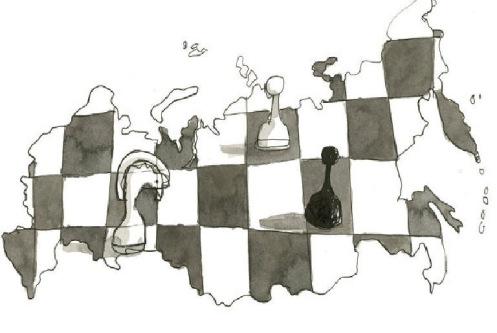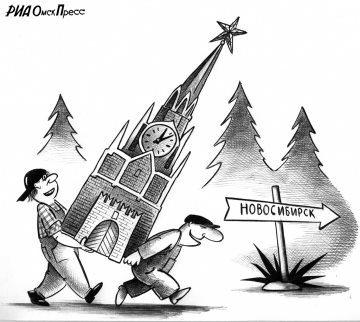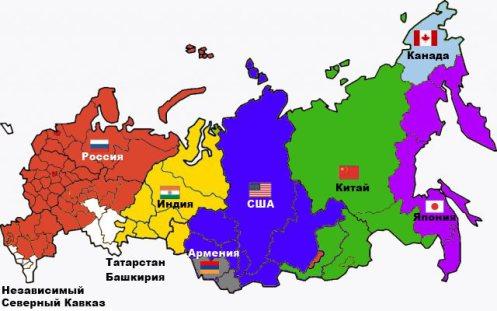We’ll begin by acknowledging that a weak leader would certainly lead to the demise of Russia as we know her. A Jimmy Carter or Barrack Obama type of weakling would be a disaster for Russia just as Mikhail Gorbachev was for the Soviet Union. To Gorbachev’s credit, he was up against two masters–Margaret Thatcher and Ronald Reagan, and few Communist leaders would have survived given the bankrupt condition of the CCCP (USSR) at the time when facing that sort of competition.
But does Russia need an authoritarian ruler to survive and prosper? No.
These are the realities of life for modern-day Russia:
- It covers 1/6 of the earth’s surface but is populated by only 143 million people.
- At ten o’clock in the morning in Moscow it is already five o’clock evening in Russia’s far east, making governance difficult.
- 51% of Asia sits inside Russia’s borders yet her Asian neighbors China to the south has 1.4 Billion people living in a smaller area as does India with a 1.2 Billion population. World history is filled with stories of empires invading others from the desire for more living space.
The photo below shows a chess game with China making a move onto Russian territory in the East.

- Russia’s two most important and strategic cities are in the 48% of the European continent that sits inside her borders. There are vast expanses east of Moscow that are near uninhabited or sparsely populated at best and many of those inhabitants are of Mongolian or Chinese ethnicity.
- Since 2011 there has been a working committee in the Duma (parliament) on ideas to move the capital to Siberia. Sergei Shoigu, governor of the Moscow region (massive area outside city limits) has suggested that the capital be moved to Russia’s third-largest city of Novosibirsk which is the capital of Siberia.

As reported on Russia Today television “In general, to be frank, many people are discussing this and I am probably one of them,” Shoigu said in an interview with the Russian News Service. “I hold that we must move the capital somewhere further, to Siberia.
- Sergei Karaganov of Moscow’s Higher School of Economics has argued that the capital should be moved to the opposite end of the country, Vladivostok, in order to be a part of the dynamic growth boom in that part of the East.
- In recent years Kazakhstan moved its seat of government from Almaty to Astana in order to be more centrally located and not allow the capital, which sat along the southern border, be so easily exposed to potential invaders. The economic growth generated by that move has been nothing short of incredible.
As part of Mr. Putin’s anti-West campaign is the idea that Western countries want to invade Siberia and cut Russia off from the East.

This map is a cartoon but it does reinforce the idea that others want to take territory away from Russia. In this illustration you see China (green), India (yellow), Armenia (gray), the USA (blue), Japan (purple) and even Canada (light blue).
There is are elements of truth in each portrayal as Russia and Japan do have border disputes in the Far East, Canada and Russia have border disputes in the Arctic, China formerly possessed wide swaths of Siberia, and the USA with forces from England and Canada controlled much of northern Siberia during the Russian revolution until Leon Trotsky’s Red Army drove them out. In that area of Russia there are small cemeteries dotting the landscape where American, British and Canadian soldiers are buried.
- Chechnya, Tatarstan and several other Muslim republics might like to break free. Tatarstan has a history almost as old as Russia itself and enjoys a healthy oil producing economy. Losing the Republic of Tatarstan with her over 1,000 year old capital, Kazan, would be a blow to the Russian economy.
That being said does not however mean that Russia needs absolute authoritarian rule to survive and prosper. Whether or not the capital is moved, it is imperative that Russia invest in the middle and Eastern portions of the country else she will lose them by neglect.
President Putin has continued the work that then-president Medvedev began on infrastructure projects and the development of resources in Siberia however he has placed severe restrictions on who can participate. The public stance is that investment participation is limited for purposes of maintaining sovereignty, but the reality is that only those companies that are a part of the Kremlin inner circle are welcome to participate.
Along with free and independent courts, open and free investment would go a long way to stabilizing Russia’s position in the center and east. Absolute rule and the concept of a national “strong man” always leads to stagnation eventually. It never grows an economy, especially the kind needed to lift such a large geographical country to the next level where the main source of wealth is generated by selling off its natural resources and thus a few become wealthy while the rest can only watch in hopelessness.
Unfortunately the idea of a healthy and growing middle class just isn’t compatible with authoritarian rule. A strong and vibrant middle class would help Russia in repopulating as well as developing and protecting her southern border areas.
Working within Russia’s legitimate framework of the rule of law and free elections, we’re hopeful that President Putin will guide the country in ways that free her people, offer them opportunity and hope, and encourage international investment to create a Russia that is independent, strong, and prosperous. The world needs a strong and free Russia to play an important role in balancing the sometimes misguided interests of the West.
